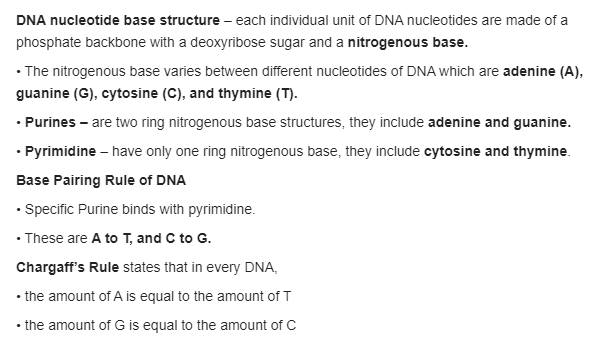In analyzing the base composition of a DNA sample, a student loses the information on pyrimidine content. The purine content is A = 27% and G = 23%. Using Chargaff’s rule, reconstruct the missing data and list the base composition of the DNA sample. (Include a brief explanation of how you got your results).
Nucleotides
It is an organic molecule made up of three basic components- a nitrogenous base, phosphate,and pentose sugar. The nucleotides are important for metabolic reactions andthe formation of DNA (deoxyribonucleic acid) and RNA (ribonucleic acid).
Nucleic Acids
Nucleic acids are essential biomolecules present in prokaryotic and eukaryotic cells and viruses. They carry the genetic information for the synthesis of proteins and cellular replication. The nucleic acids are of two types: deoxyribonucleic acid (DNA) and ribonucleic acid (RNA). The structure of all proteins and ultimately every biomolecule and cellular component is a product of information encoded in the sequence of nucleic acids. Parts of a DNA molecule containing the information needed to synthesize a protein or an RNA are genes. Nucleic acids can store and transmit genetic information from one generation to the next, fundamental to any life form.
In analyzing the base composition of a DNA sample, a student loses the information on pyrimidine content. The purine content is A = 27% and G = 23%. Using Chargaff’s rule, reconstruct the missing data and list the base composition of the DNA sample. (Include a brief explanation of how you got your results).

Learn your way
Includes step-by-step video
Step by step
Solved in 2 steps with 2 images









